
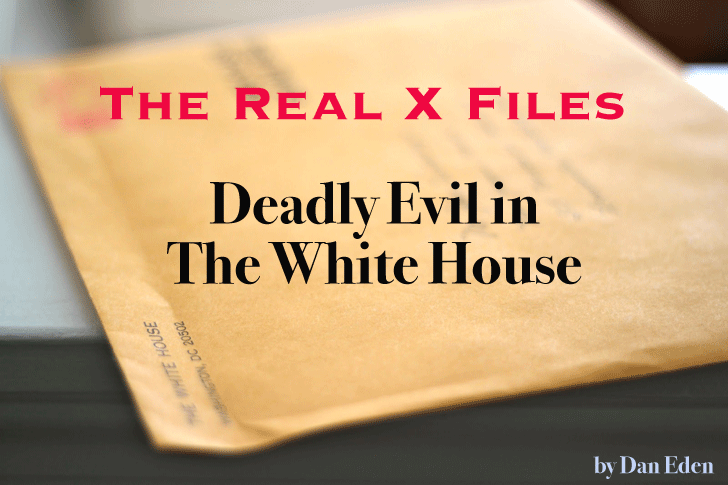
Forget about the aliens. The real x-files, discovered in the Lyndon B. Johnson Library in Austin, Texas, have more relevance today, especially today, than any disclosure about UFOs or life on a distant planet. Discovered in 1994, these files reveal the sordid truth of unquestionable evil that has dominated the American government since the late 60s and, many can argue, persists even now.
If you are over 60 years of age, this story will trigger some painful memories. If you are younger, you might not immediately understand the significance of what you will hear. But the truth contained in these "x-files" -- and that is what they were called -- will ring true for anyone old enough to have lived through the many wars in Iraq, Afghanistan and elsewhere. It will shed light on the economic disaster of 2008, why you are unemployed and even why there is a move afoot to take your guns away.
The subterfuge actually began 3 years earlier, but we'll pick up the story in 1967, during the height of the Summer of Love.

World War II had been a war with clear goals and an unquestionable threat to the freedom and way of life to America and our allies. It was a patriotic war that very few protested, and America emerged as a powerful, victorious nation. Returning soldiers were greeted with respect and camaraderie. The military industrial complex, a phrase coined by President Dwight Eisenhower, carried its momentum to peacetime and the American dream was made real with easy home ownership, ample employment and the incentive to have large families.
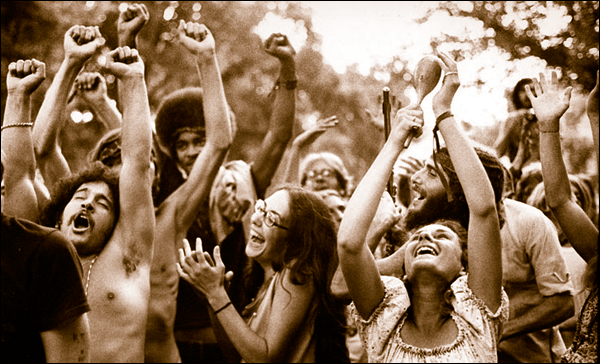 The birth bubble created a need for more schools and infrastructure. Parents sought to provide their children with the things they had been without. Foremost was the benefit of higher education. In the mid-60s there began a booming population that filled the colleges and universities, made affordable by a prosperous economy. Few college aged youth were even aware of the Gulf of Tonkin incident that initiated the flow of advisors and troops to the previously unknown country called Viet Nam. Initially, this was portrayed as another patriotic war and, like the conflict in Korea, it was supported without question. But as war casualties began to mount, the young Americans began to question why they were over there and whether the assumed danger of communism was really a threat worth dying for. Conversations and questions about the Viet Nam War created tension in American households. World War II veterans could not understand the audacity of their children to question the government's intent and a schism of generations began to isolate the youth from their parents. By 1967, the Viet Nam war had been getting bad press, describing it as a stalemate. President Lyndon Johnson continued to increase troop levels, but the death tolls of American soldiers and gruesome footage of real war scenes on nightly television were inciting fear and protests on campuses and many cities around the nation. This was made even more relevant because of mandatory conscription (i.e. draft) which lasted for the duration of the war.
The growing anti-war sentiment was ripe for some kind of organization and this came to fruition in 1967 when the Summer of Love inaugurated a cultural phenomenon that had its ground zero in San Francisco's Height-Ashbury district and, to a lesser degree, New york's Greenwich Village. Like Mecca, every counter-culture baby boomer was drawn to make the pilgrimage with a headband and, as the song says, "some flowers in your hair."
Returning troops who had been introduced to marijuana brought the habit back with them and it soon became an experience that put a solid wall between the young and old. LSD and other psychedelic substances became the catalyst that caused rejection of the standard reality causing the military aged youth to, as Timothy Leary suggested they do, "Turn on, tune in and drop out." Many did just that. Mandatory registration with the Selective Service (i.e. "the draft") was resisted while thousands of military eligible men took to the streets or fled to Canada rather than participate in the Viet Nam War. It was a turbulent time, often resulting in violent conflicts with police.
|
The Tide Turns
By 1968, LBJ had become increasingly aware that the war was a mistake. The pinnacle moment supposedly came when Walter Cronkite, a news presenter on CBS, broke his tradition of not commenting on news stories to report the apparent stalemate and futility of the Viet Nam war. His respected opinion gave many the excuse to voice their own dissent and soon the antiwar movement was posing a threat to the Democrat's hold on the presidency.
Hubert Humphrey (Democrat) was not the anti-war movement's optimum choice. His stand was much weaker than that of George McGovern or Muskie (who had lost the Democratic Convention's endorsement), but his less liberal approach garnished the votes of many patriotic Americans that opposed the quagmire in Viet Nam. His opponent was Richard Nixon (Republican), a man who had sought to defeat John Kennedy back in 1960.
LBJ had sought to drive Ho Chi Minh (North Viet Nam) to the Paris Peace Talks by escalating the bombing of Hanoi. As the presidential elections drew near, in October of 1968, it seemed that this was approach was gaining momentum. There was hope that the carnage -- 30,000 American and 1,000,000 Vietnamese casualties -- would soon end in some kind of compromise that would allow South Viet Nam to opt out of Communist control. Johnson and Nixon both knew that this would be beneficial to the Democrats and allow their continued control of the presidency.
The CO$T of Peace
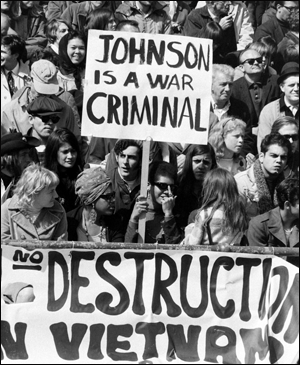 Although things had been going well with preliminary plans for a peaceful settlement at the Paris Peace Talks, suddenly there was a snag. The chief negotiator for the South, President Nguyen van Thieu, was unexpectedly laying down obstacles which threatened the entire process.
Although things had been going well with preliminary plans for a peaceful settlement at the Paris Peace Talks, suddenly there was a snag. The chief negotiator for the South, President Nguyen van Thieu, was unexpectedly laying down obstacles which threatened the entire process.
In late October of 1968, a frustrated President Johnson learned that candidate Richard Nixon had sent an envoy to Saigon at the insistence of his financial backers, representing the big business and military contractors. The envoy had met with President Thieu and warned against any quick peace deal claiming that his regime would fare better when Nixon was in the White House.
The military industrial complex had, by the 60s, diversified to service the needs of the affluent American consumers. But factory output was dropping as consumers became saturated with goods. The war was a gift and a financial boon for them. Their lust and greed for money, the original raison d'etre for the war, was threatened by the prospect of an abrupt peace deal. Every possible effort was directed to supporting Nixon over Humphrey and many clandestine deals were made with President Thieu in lieu of his cooperation to scuttle the proposed peace negotiations.
LBJ learns about the scheme
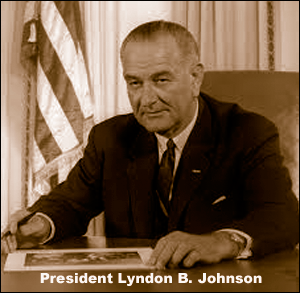 LBJ was first informed about the financial motives and political interference by one of his advisors, Eugene Rostow, Johnson's Under Secretary of State for Political Affairs. Rostow heard of this from his brother who attended a meeting chaired by wealthy financier, Alexander Sachs, a Jewish Zionist [1] on the Board of Lehman Brothers investment group (and also past Vice-President of that firm), who advised large financial investors that benefited from the Viet Nam War. While some people were anti-war, Sachs and his associates were clearly anti-peace.
LBJ was first informed about the financial motives and political interference by one of his advisors, Eugene Rostow, Johnson's Under Secretary of State for Political Affairs. Rostow heard of this from his brother who attended a meeting chaired by wealthy financier, Alexander Sachs, a Jewish Zionist [1] on the Board of Lehman Brothers investment group (and also past Vice-President of that firm), who advised large financial investors that benefited from the Viet Nam War. While some people were anti-war, Sachs and his associates were clearly anti-peace.
Johnson immediately ordered the FBI to pursue this lead and authorized wire taps and other clandestine means to prove and document the allegations. The results confirmed his suspicion.
Johnson attempted to stop this "act of treason" by contacting Republican leader, Senator Everett Dirkson, who relayed the concerns directly to candidate Richard Nixon.
In a phone conversation, recorded by The White House, Johnson threatened to go public about the act.
Johnson: "The agent [Chennault] says she's just talked to the boss in New Mexico and that he said that you [South Vietnam] must hold out, just hold on until after the election."
"We know what Thieu is saying to them out there. We're pretty well informed at both ends."
"I don't want to get this in the campaign. They oughtn't be doing this. This is treason."
Dirksen: "I know."
Johnson: "I think it would shock America if a principal candidate was playing with a source like this on a matter of this importance. I don't want to do that [go public]. They ought to know that we know what they're doing. I know who they're talking to. I know what they're saying."
Dirksen: "I better get in touch with him [Nixon], I think."
Johnson: "They're contacting a foreign power in the middle of a war. It's a damn bad mistake. And I don't want to say so. ... You just tell them that their people are messing around in this thing, and if they don't want it on the front pages, they better quit it."
On November 3rd, just two days before the presidential election, Nixon feared that Johnson would blow the lid off his scheme to stop the peace talks. He called LBJ directly, lying to save his political future. He didn't know that Johnson already had the proof.
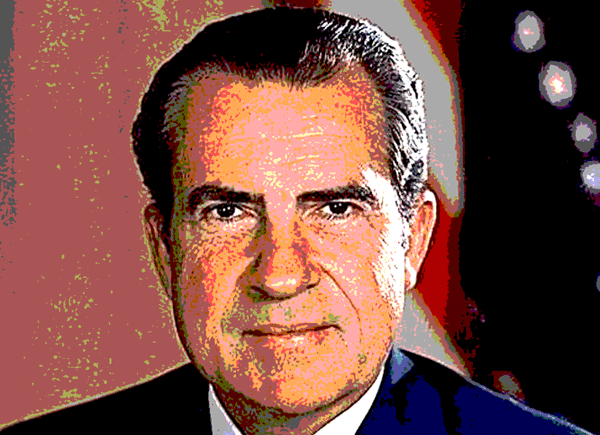
Nixon does the usual... he lies
A missed opportunity & bad reasoningNixon: "I just wanted you to know that I got a report from Everett Dirksen with regard to your call. ... I just went on 'Meet the Press' and I said ... that I had given you my personal assurance that I would do everything possible to cooperate both before the election and, if elected, after the election and if you felt ... that anything would be useful that I could do, that I would do it, that I felt Saigon should come to the conference table..."
"I feel very, very strongly about this. Any rumblings around about somebody trying to sabotage the Saigon government's attitude, there's absolutely no credibility as far as I'm concerned."
Johnson: "I'm very happy to hear that, Dick, because that is taking place. Here's the history of it..."
[Johnson then recapitulated the evidence the FBI had gathered]
"I didn't want to call you but I wanted you to know what happened."
"Then the traffic goes out that Nixon will do better by you. Now that goes to Thieu. I didn't say with your knowledge. I hope it wasn't."
Nixon: "My God, I would never do anything to encourage ... Saigon not to come to the table. ... Good God, we want them over to Paris, we got to get them to Paris or you can't have a peace. ... The war apparently now is about where it could be brought to an end. The quicker the better. To hell with the political credit, believe me."
Johnson: "You just see that your people don't tell the South Vietnamese that they're going to get a better deal out of the United States government than a conference..."
The next day, a reporter from the Christian Science Monitor filed a sensational story outlining what had been happening from reliable sources in Saigon. The news was so shocking and potentially lethal to Nixon that the editor decided to check the facts with the White House. No one at the press office dared to comment and so the decision to confirm the story went all the way to the top executive, LBJ himself.
The story lead off with: Purported political encouragement from the Richard Nixon camp was a significant factor in the last-minute decision of President Thieu's refusal to send a delegation to the Paris peace talks -- at least until the American Presidential election is over.
In a conference call with Secretary of Defense, Clark Clifford, LBJ was given advice to deny the story.
"Some elements of the story are so shocking in their nature that I'm wondering whether it would be good for the country to disclose the story and then possibly have a certain individual [Nixon] elected... It could cast his whole administration under such doubt that I think it would be inimical to our country's interests."
The story never ran. Nixon won the presidential election by less than 1% of the popular vote, escalated the war for Sachs and his investors and an additional 24,000 young Americans and another million Vietnamese died before the peace treaty was signed almost 5 years later.
Too little, too late
LBJ called out Nixon for his treason shortly after he won the election.
"They've been quoting you [Nixon] indirectly, that the thing they ought to do is to just not show up at any [peace] conference and wait until you come into office. Now they've started that [boycott] and that's bad. They're killing Americans every day. I have that [story of the peace-talk sabotage] documented. There's not any question but that's happening. ... That's the story, Dick, and it's a sordid story. ... I don't want to say that to the country, because that's not good."
After coming to office, Richard Nixon tried to steal the files documenting this act of treason, including the FBI audio tapes and memos. They were all kept in a safe at the Brookings Institute. White House transcripts reveal that he tried to have the CIA break in and destroy them, similar to what he eventually did in the infamous Watergate scandal that resulted in his resignation and imminent impeachment.
Nixon: "You talk to Hunt. I want the break-in. Hell, they do that. You're to break into the place, rifle the files, and bring them in. ... Just go in and take it. Go in around 8:00 or 9:00 o'clock."Haldeman: "Make an inspection of the safe."
Nixon: "That's right. You go in to inspect the safe. I mean, clean it up."
But, unknown to Nixon, the evidence of his treason was already removed and found its way to a file, marked "X File", and stored in the Lyndon Johnson Library in Austin, Texas. A note appended to the manilla envelope read, "To be opened by the Director, Lyndon Baines Johnson Library, not earlier than fifty (50) years from this date June 26, 1973."
Curiosity got the better of the museum curator and the X-File was opened in July of 1994. These facts have been known but rarely publicized -- perhaps because so many similar acts have been repeated since. In fact, Ronald Reagan's dealing with the Iranian held hostages is almost certainly a valid example of this so-called "October Surprise". And there are undoubtedly worse things that we don't know about, happening as I write this.
Money from blood...
The Gulf of Tonkin incident, now patently recognized to be a "false flag" operation, started the Viet Nam war in 1964. It was motivated by political greed and lust for money, as was Nixon's act. 54,000+ young Americans died because of this war and perhaps two million Vietnamese perished both in the war itself and its aftermath in Cambodia's "killing fields" by Pol Pot.
The fact that making money was the motive for taking so much blood and treasure from both countries is truly "inhuman" yet it continues today, streamlined, more clandestine and efficient. Financial institutions like Goldman Sachs, George Bush's Carlyle Group (arms dealers), Cheney's Halliburton, Raytheon and other military contractors, continue their subterfuge unchecked, bleeding our economy to sustain their grandiose lifestyles while average Americans struggle with poverty, unemployment and continue to send their youth to new and varied "killing fields".
Goldman Sachs CEO Lloyd Blankfein Gets 75 Percent Raise
Angry about your paycheck shrinking this year because the payroll tax cut expired? Well, this should cheer you right up: Goldman Sachs's CEO got a 75 percent raise in 2013 -- just 5 years after they participated in the largest bank fraud in American history.
Lloyd Blankfein made $21 million last year, including a $2 million salary and a $19 million bonus, CNN/Money reports. That bonus includes $5.6 million in cash. Bloomberg pegs the total pay at $19 million, but what's a couple of million dollars, really?
Blankfein's haul represents a 75 percent pay increase from the year before, CNN/Money notes. It is also nearly double the paltry $11.5 million that Jamie Dimon, CEO of the nation's biggest bank, JPMorgan Chase, took home. [source]
So there!
Editor's Note: Thanks to Robert Perry and his new book America's Stolen Narrative for revealing some details in this story.

COMMENTS:
Is it any wonder that they put fluoride in our water and want to take away our guns? If people woke up about how their elected officials and the Zionists controlled banks ran this nation there would surely be an uprising.
MkS
I heard rumors of this story years ago but not the details. Thanks to viewzone and Mr. Perry for putting the pieces of the puzzle together. As you suggested in the first paragraph, the Iraq war and Afghanistan war was a war of choice, motivated by these same money greedy people. I suspect we will not see a middle-East peace for years to come for the same reasons.
HB2159
Thanks for having the balls to post this story. Perhaps LBJ didn't act with more aggression because he felt guilt from his involvement in the JFK assassination. Or maybe he knew that Nixon knew... just a thought.
BarbF
All wars are for profit. End of story.
Anonymous
I'm surprised rense.com has not linked to this story. The influence of zionist Jews on American international and domestic policies has been a clandestine operation for decades. Rense has been one of the few people to bring this to light. Have you tried to let him know about this story?
JTd.
Editors Note: Yes, JTd. While I'm not certain about this, it seems Jeff Rense has some problem with viewzone because we once carried a story by an author he disliked. I guess you would have to ask him why.